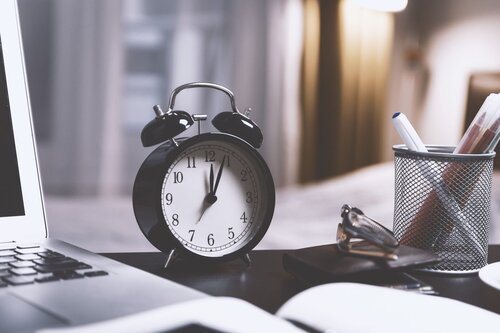How to Sleep Better with These Easy Tips
You’ve heard the familiar question, “Did you get up on the wrong side of the bed?” Most everyone has experienced what it’s like to not have had a good night's sleep. Unfortunately, not getting enough sleep can be more challenging for some than others. This lack of sleep can result in fatigue, irritability, difficulty concentrating, and even headaches. On top of that, lack of sleep can result in mood lability. After a serious lack of sleep, have you ever felt the urge to cry, even though the topic at hand is not one that would typically make you cry? Getting the sleep we need is crucial for our physical and mental health.
Sleeping Difficulties and Mental Health
It’s not uncommon for people with depression, anxiety, or trauma to experience sleeping difficulties. People with anxiety may experience racing thoughts that prevent them from falling asleep at night. People with depression may wake up through the night, find that they can’t sleep as long as they’d like, or find that they want much more sleep than usual. Trauma can result in difficulty falling asleep if nighttime creates fear, or if the person is afraid of experiencing a nightmare. Nightmares might also wake people up, making it difficult to fall back asleep.
Given the many negative effects of not getting enough sleep, it’s really important to work on good sleep hygiene. Getting the sleep you need doesn’t need to be difficult. Try these steps below to help improve your sleep.
Get Better Sleep with These Easy Steps
Follow a consistent sleep schedule.
If you’ve raised children (or babysat for some), then you know how important a consistent sleep schedule is for children. A consistent naptime and bedtime gets children into a routine which is helpful for parents and children alike. As adults, it’s no different. We might like to think it’s OK for us to go to bed whenever we like, but the reality is that we need this consistency, too.
Creating a sleep schedule that is consistent on weekdays and weekends allows us to get into a routine, and eventually our bodies will feel prepared for sleep as our bedtime approaches.
Create a bedtime ritual.
Think about the bedtime rituals your parents used when you were younger or that you used with your own children. Perhaps the bedtime ritual consisted of a glass of warm milk, a warm bath, a bedtime story, or a bedtime prayer. When done consistently, these rituals signal that it’s time to prepare for bed. As adults, these rituals can help us well. Common bedtime rituals include unwinding with a hot cup of herbal tea, a warm bath, time with a good book, or time for prayer, journaling, or reflection. Consider the bedtime ritual that you could use on a consistent basis.
Reserve the bed/bedroom for sleep and sex.
For many, the bed is a place where you read, watch TV, work, do homework, eat, and many other things besides sleep. For sleep hygiene purposes, we want the bed to be associated with sleep, rather than all of these other activities. While this may feel like a big shift for those who really enjoy their extended time in bed, this change can help you improve your sleep.
Prepare your bedroom for sleep.
Unwanted lights, loud noises, and uncomfortable temperatures can all interfere with sound sleep. Before going to bed, adjust the room’s temperature, so it’s not too hot or too cold. If you’re sensitive to lights, be sure to close the blinds or curtains or consider using a sleep mask. If noises are the problems, consider turning on a fan or using a white noise machine to drown out the sounds of sirens or people on the street.
Don’t be a clock watcher.
Have you ever found yourself checking your phone or alarm clock when having difficulty falling asleep? Perhaps you’ve found yourself doing this after waking up in the middle of the night and having difficulty falling asleep. In general, it’s recommended that you stay away from watching the clock.
When we watch the clock and see the time pass by, we tend to experience frustration and thoughts about how exhausted we are going to be the next day. These thoughts and the resulting frustration and stress only make it more difficult for us to fall asleep.
Stay in bed only for as much time as you need.
Staying in bed longer than necessary can be tempting if you’ve had a rough night of sleep or finally have the opportunity to sleep in. You might also be tempted to stay in bed if your depression makes you want to put the covers over your head and avoid the day. Staying in bed longer than necessary, however, can cause you to feel tired, rather than rejuvenated throughout the rest of the day. If your body let’s you know that it’s time to wake up, consider listening and getting out of bed rather than going back to sleep.
Limit naptime.
If you have difficulty sleeping and find yourself napping throughout the day, you may need to limit your naptime. Not allowing yourself to catch up on sleep during the day will allow you to build up your sleep drive, so you can sleep better that night. Making it throughout the day when you haven’t slept well is uncomfortable, of course, but it will help you be ready for sleep later on. If you find that naps prevent you from falling asleep at night, it’s possible that your naps are too long. If you are able to take naps at all, limit them to approximately 20 minutes.
Limit caffeine.
If you have difficulty sleeping at night, you may want to consider reducing your caffeine or refraining from caffeine past a certain time of day. Pay attention to the foods, beverages, and over the counter medications you are consuming as they may contain caffeine.
Limit liquids before bedtime.
Having to go to the bathroom in the middle of the night can easily disrupt sleep. If having to use the restroom is one of the main reasons you wake up at night, consider limiting the liquids you consume before bedtime.
Be mindful of the impact that alcohol and nicotine can have on your sleep.
Nicotine and alcohol can both impact your sleep. While drinking before bedtime may help you feel sleepy, alcohol can result in fragmented sleep. Studies show that people who smoke do not sleep as well as people who do not. People who smoke may also experience fragmented sleep. If sleeping the night through is a problem for you, you may want to look at your alcohol and nicotine use.
Exercise (but not close to bedtime).
Exercise offers a number of benefits for our physical and mental health. Exercise is also shown to help people sleep better at night. Exercising too close to bedtime, however, can boost our energy, making it difficult to fall asleep. Be mindful of when you exercise in order to get this perk!
Be mindful of medications.
Do you take any medications regularly? Depending on the medication, you may need to be mindful of when you take it. Some medications, if taken too late at night can cause people to feel groggy the next morning. Some medications, such as stimulants, may need to be taken by certain times of the day, so that they don’t keep you up at night. Just like sleep, it’s a good idea to take your daily medications at a consistent time.
Need more help with sleep?
If you have been following all of these steps consistently, and are still having difficulty sleeping, consider keeping a sleep log. A sleep log will allow you to track when you are getting into bed each night, when you are falling asleep, the number of times you wake up, and your wakeup time. A sleep log might also ask you to track when you took your medications, napped, and consumed caffeine.
These logs can find helpful patterns in your sleep routine. Bring your sleep log to the next visit with your primary care or therapy appointment. You and your doctor or therapist can then review what’s happening to notice any patterns and create a plan to help you sleep better.
Do you suspect that your sleeping difficulties are related to your mental health?
If the information presented in this blog has you thinking that your sleeping difficulties might be due to a mental health concern like depression, anxiety, or trauma, it’s important to know that mental health treatment can help. For some this consists of medication, therapy, and/or a combination of those two. Getting help so you can improve your sleep and overall well-being is an act of self-care.
Search Our Other Blogs!
Interested in Counseling for Anxiety, Stress, and Restlessness?
If you’re a Marylander who knows that counseling is the direction you need to take, the therapists at LifeSpring Counseling Services are here to help. We offer online counseling services for mindfulness, depression, anxiety, trauma, and grief and loss. We also offer Brainspotting as a specialized service, and Brainspotting can be done online, too!
Here’s how you can get started! Online counseling for anxiety, stress, and restlessness aren’t the only services offered at our Maryland office
The counselors and social workers at our Maryland office also offer counseling services for trauma, grief and loss, boundary setting, communication skills, and difficult life transitions. We also offer specialized counseling services including Brainspotting and spiritually-integrated counseling. Because we are located next to several local universities, we also work with college students and international students.
Written By: Melissa Wesner, LCPC
Photo Credit: Toa Heftiba, Burak Kebapci, cottonbro, JESHOOTS, fotografierende, and Ketut Subiyanto on Unsplash and Pexels
Date of Download: 10/19/2020





